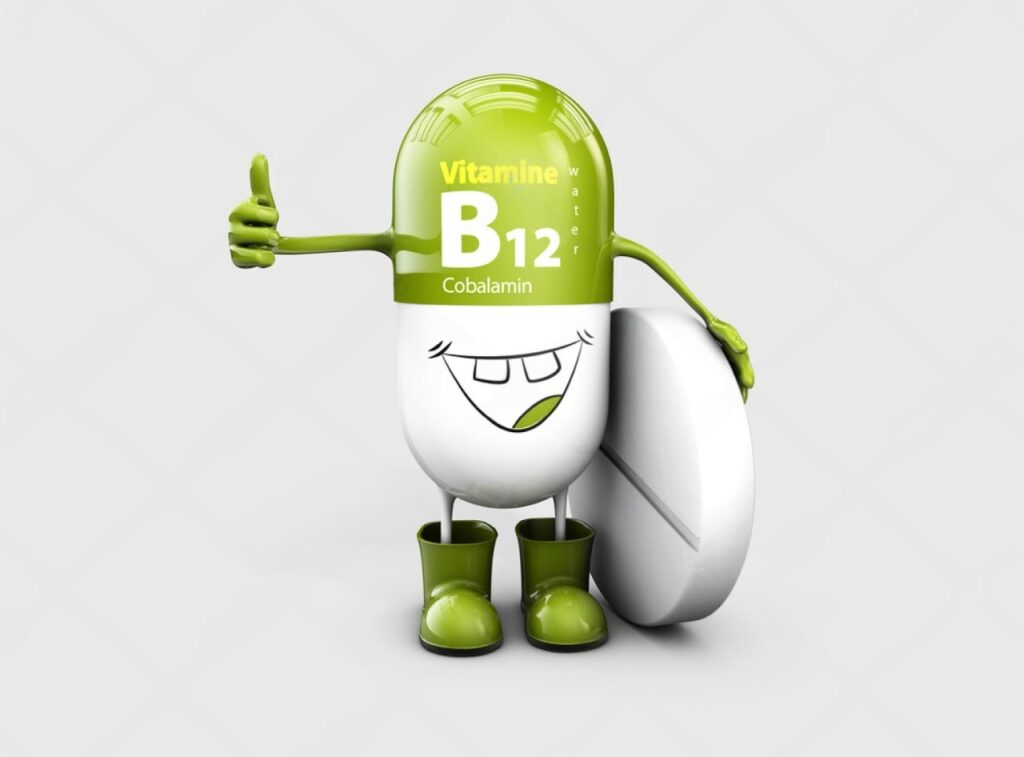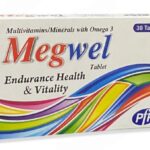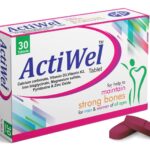What Is Vitamin B12?
Vitamin B12 is also known as cobalamin. It is a member of the B-complex family. It is a water-soluble vitamin the body needs regularly for several functions by collaborating with other vitamins. Vitamin B12 works as a cofactor for two enzymes, methionine synthase and L-methylmalonyl-CoA mutase.

Methionine synthase plays a role in converting homocysteine into the essential amino acid methionine. Methionine is required for the formation of S-adenosylmethionine, a universal methyl donor for approximately 100 different substrates, including DNA, RNA, proteins, and lipids.
L-methylmalonyl-CoA mutase converts L-methylmalonyl-CoA to succinyl-CoA, a short-chain fatty acid, in the metabolism of propionate.
Types of Vitamin B12
Vitamin B12 is not a single compound. There are the following forms of B12:
- Methylcobalamin – The active form used in your body.
- Cyanocobalamin – The synthetic version found in supplements.
- Hydroxocobalamin – Often used in injections.
- Adenosylcobalamin – It works inside your mitochondria (your cell’s powerhouses).
Each form has its own benefits, but they all ultimately convert into active B12 that your body can use.
Why Does The Body Need Vitamin B12?
Think of vitamin B12 as your body’s backstage crew. You can’t see it, but without it, the show stops. B12 is important for:
- Forming healthy red blood cells
- Making DNA
- Metabolizing fats and proteins
- Supports brain health
Nervous System
B12 helps the myelin sheath form the protective covering around your nerves. B12 helps maintain the myelin sheath, which is the protective covering around your nerves. Without it, nerves can become exposed and damaged like electrical wires.
This can lead to memory loss, numbness, or even long-term nerve damage.
Energy
Many people associate B12 with an energy boost, and for good reason. While B12 is not directly involved in producing energy, it plays a role in metabolic processes that do so.
Symptoms of Vitamin B12 Deficiency
Deficiency occurs when you are not getting or absorbing enough amounts of B12 vitamin. Early symptoms may be vague but should not be ignored:
- Fatigue
- Brain fog
- Mood swings
- Pale skin
- Tingling in hands and feet
When the deficiency is increased and advanced then you can experience the following problems:
- Memory loss
- Difficulty walking
- Vision problems
- Depression
- Glossitis (a swollen, inflamed tongue)
Common Causes of Deficiency
B12 is naturally found in animal products. Deficiency occurs due to certain factors, age, gender, lifestyle, or any health condition.
So if you’re a vegetarian, it can be difficult to get enough without a fortified diet or supplements.
Even if you eat enough B12, your body may not be able to absorb it properly due to:
- Pernicious anemia
- Atrophic gastritis
- Crohn’s disease
- Long-term use of antacids or metformin
Some groups are at higher risk of deficiency:
- Adults over 60
- People with gastrointestinal disorders
- Vegans and strict vegetarians
- Pregnant or breastfeeding women
Sources
Sources include animal, plant-based, and supplements.
Animal-Based Sources
When it comes to natural B12, the animal-based sources are the best::
- Beef liver
- Clams
- Tuna
- Salmon
- Eggs
- Dairy (milk, yogurt, cheese)
Fortified Foods for Vegetarians
If you are vegetarian and do not eat animal products such as meat, poultry etc, no problem. You can B12 vitamin from these:
- Fortified breakfast cereals
- Nutritional yeast
- Fortified plant milks (soy, almond, oat)
- Meat alternatives with added B12
Types of Supplements
There is no shortage of supplements. B12 can be found in:
- Tablets (most common)
- Sublingual lozenges (under the tongue)
- Sprays
- Injections
Dosage
The recommended daily intake (RDI) of vitamin B12 is:
Adults (14+): 2.4 mcg
Pregnant women: 2.6 mcg
Breastfeeding women: 2.8 mcg
Children: The RDA varies based on age, starting at 0.4 mcg for infants and increasing with age. For example, children ages 4-8 need 1.2 mcg, while children ages 9-13 need 1.8 mcg.
Older adults (50+): Due to the potential low absorption of naturally occurring vitamin B12, it is recommended to meet the RDI through fortified foods or supplements.
Toxicity and Side Effects
Good news – B12 is water-soluble, so any excess is usually flushed out of your body through urine. There is no upper limit established because it is considered very safe. That said, extremely high doses can cause:
- Breakouts
- Dizziness
- Nausea
Final Thoughts
Vitamin B12 may be small, but its impact is huge. Whether you’re a meat eater, vegan, or somewhere in between, paying attention to your B12 intake is key. Don’t brush off fatigue, brain fog, or tingling fingers as your body is waving a red flag. A simple blood test and a smart approach to nutrition can keep you energized, fast, and healthy for the long haul.



Pingback: MECVIT Softgel Capsules (Methylcobalamin, Folic Acid, Alpha Lipoic Acid) - The Nutrio
Please guide on mineral such as calcium, iron, sodium, etc.